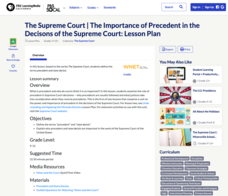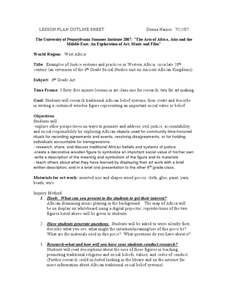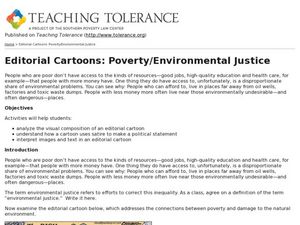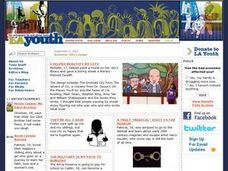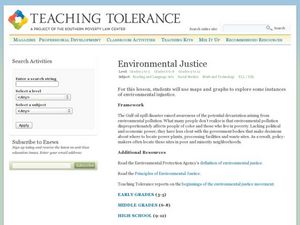iCivics
Mini Lesson: Supreme Court Opinions
The court of last resort. Historians research, using current cases and issues, the impact the Supreme Court of the United States has on how our nation operates. They analyze recent decisions made by the nine judges and determine how the...
Judicial Learning Center
Judicial Independence: What’s Wrong with This Court?
Why is it important for judges to operate independently of politics or other branches of government? Scholars ponder the question as they examine video clips, case studies, excerpts of the US Constitution, and an interactive computer...
Judicial Learning Center
Understanding the Types of Cases
Most young scholars are aware of the criminal courts system, but the United States Constitution allows for a much broader role. What other roles do courts play in settling other questions? A case study and WebQuest-style activities...
PBS
Analyzing McCulloch v. Maryland
What happened in the Supreme Court case of McCulloch v. Maryland? The resource teaches the specifics of the case with a video and provided discussion questions covering issues such as precedent and the Supreme Court as an equal branch of...
PBS
The Supreme Court: The Importance of Precedent in the Decisions of the Supreme Court
People often hear the words precedent and Supreme Court together, but why? A resource on the Supreme Court includes a variety of discussion questions, handouts that guide young historians, a video about Nixon and the court system, and...
PBS
The Supreme Court: Civil Rights and Civil Liberties
While World War II changed the international order, it also led to a fundamental shift in the concept of civil rights within the United States. Using a video and discussion questions, class members consider the effects the war had to the...
National Endowment for the Humanities
A Day for the Constitution
The "Constitution Day and Citizenship Day" law requires schools receiving any federal funding to provide educational programming on the history of the American Constitution. The lesson plans, materials, videos, questions, and activities...
Facing History and Ourselves
Defining Democracy
For democracies, it is both the best and the worst of times. As part of a study of the challenges facing democracies, young political scientists seek first to define democracy, and then to consider the relationship between democracy and...
National Endowment for the Humanities
Oyez! Oyez! Oyez!: Simulating the Supreme Court
Students have freedom of speech—or do they? Using an actual court case and research materials on the Supreme Court, young legal scholars examine the Supreme Court's role and history. Then, they argue a case the court declined to hear and...
US House of Representatives
A Picture is Worth a Thousand Words
Groups select a photograph from one of the four eras of African Americans in Congress and develop a five-minute presentation that provides background information about the image as well as its historical significance. The class compares...
Curated OER
For The Sake Of Security: U.S.A. Patriot Act & Bill of Rights
A substantive New York Times article about the U.S.A. Patriot Act, military tribunals, racial profiling, and the Bill of Rights forms the basis for a discussion of the complex interplay of fundamental American rights and the aftermath of...
Curated OER
Due Process Freedoms
Young scholars participate in a simulation of the voir dire portion of a trial. There are student lawyers assigned for the prosecution and the defense. They must review and question all prospective jurors to obtain a fair and impartial...
Curated OER
Indiana Courts: How Do They Work?
Students identify the branches of Indiana's judicial system and determine the differences between the different courts and different types of cases. Students create a flow chart showing how a court case works its way through the legal...
Curated OER
Examples of Justice Systems and Practices in Western Africa
Tenth graders explore African belief systems. In this West African lesson, 10th graders research these belief systems. Students create a wooden figure that represents these beliefs.
Curated OER
Mediation/Conciliation
Twelfth graders discuss the court system in Japan, and assume roles of family members and friends of air crash victims. They discuss whether they would file suit against airlines, compare methods of achieving justice in United States and...
Curated OER
Justice & The Generals: Education - Lesson Plan 4 - United States: Friend or Foe of Human Rights? | PBS
Students asses and analyze the role of the United States in El Salvador and the Ford v. Garcia trial. They determine the circumstances and individuals that guide United States foregin relations within the context of human rights.
Curated OER
Editorial Cartoons: Poverty/Environmental Justice
Students analyze political cartoons. In this political cartoon lesson, students analyze an editorial cartoon to develop an understanding of the historical context, symbolism, visual composition, and satire of the cartoon regarding...
Curated OER
Law in the Future
Students develop a legal system. In this justice system lesson, students examine case law in the Untied States and draw on that experience to create a legal system for a "moon colony" which integrates the legal systems on Earth.
Curated OER
Opening Eyes, Changing Minds. Talking About Personal Transformation And the Development of World Views
Students read one teen's story of personal growth through learning about racism and the criminal justice system to explore how individuals' world views are shaped and changed through experiences and education.
Curated OER
Rules and Laws
Students investigate the difference between rules and laws. In this justice system lesson, students discuss the presence of rules of their lives and compare them the "Code of the West."
Curated OER
Environmental Justice
Students explore the concept of environmental stewardship. In this Gulf Oil Spill lesson, students discuss how environmental pollution affects those how live in poverty at a higher rate than those with more affluence. Students read...
Curated OER
COMMUNITY JUSTICE
Students investigate the place of citizens in a society. They also research the way a court system works in conjunction with law enforcement. Students apply his/her understanding and knowledge of the law enforcement and court system when...
BBC
Crime
Crime and punishment! Learners discuss the law, civics, and crime in the UK. They brainstorm lists of crimes and possible punishments, complete activities on a website, role-play a Juvenile Court scenario, and try to think of ways they...
Curated OER
What Can You Find in the Cabinet?
Looking in the cabinet can be fascinating! Examine the various departments of the Executive Cabinet in this group research project, which jigsaws so each small group has a different department and presents to the class. Groups create...
Other popular searches
- And Social Justice
- Math and Social Justice
- Art and Social Justice
- Latino Social Justice
- Social Justice Lesson Plan
- Peace and Social Justice
- Music and Social Justice
- Rap and Social Justice
- Steps for Social Justice
- Economic and Social Justice
- Science and Social Justice
- Equality and Social Justice






